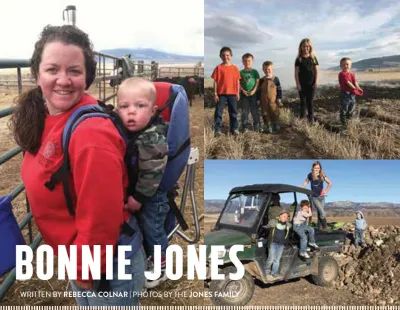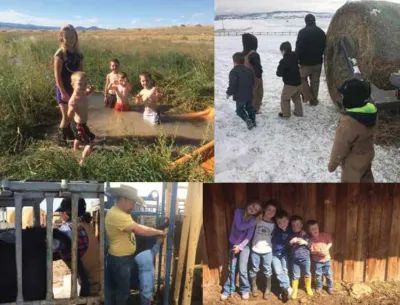Bonnie Jones—Family Life on the Ranch
April 19, 2017
Posted By: Shaunescy


WRITTEN BY REBECCA COLNAR | PHOTOS BY THE JONES FAMILY
One of the aspects that defines agriculture is that it’s frequently a multi-generational business. Bonnie Jones of the Diehl Ranch near East Helena is no exception. She is a fourth-generation rancher who is busy raising the fifth generation.
“My dad died when I was 14, so my grandfather, my husband and my uncle are the ones running the ranch,” notes Jones. The fact that Bonnie and her husband, Casey, have five children between the ages of 10 and 5 almost guarantees that at least one will carry on the family tradition of raising Black Angus cows and calves, wheat, barley and alfalfa. Skills are learned at a young age.
Every day the children are solely responsible for feeding the horses, chickens, dogs and cats. They help their parents feed the cows and pigs. The ranch mom says that from day one, a baby is strapped to her back as she does her chores. “They get involved just by being present,” she explains. “As they grow, we help them at their level. Maybe feeding will take a little longer since a 5-gallon bucket of grain is too heavy, but to us, it’s more valuable to take longer and have them learn than to just go and do it ourselves. Safety is very important, so we teach them to never get near the tires of equipment or under a hay bale. We tell them machinery can be scary. We explain if there is a cow that is very protective of her calf, get up on the fence. We don’t want them to be fearful, but to be aware at all times of what is going on around them.”
Jones chuckles that the kids aren’t necessarily willing to work everyday. “We’ll get some whining, ‘We don’t want to.’ Our response is that, ‘this is our life, work must get done.’ You can have a good attitude or you can grumble. No matter what you do, you can find the bad, or look for the good.”
She says that every day on the ranch is an adventure. “We try to make it fun. In the winter they will go sledding and build snow forts. In summer, they’ll swim in the irrigation ditch—where the water is low—and run under the pivots to stay cool and build forts out of hay. As they get older, they get more adventurous. One rule is they must tell me where they are going. We encourage them to explore as long as they stay safe.”
The Joneses are proponents of homeschooling. “One benefit is we can control to some degree what they learn, and instill our beliefs into their schooling. Homeschooling especially works great with the ranch lifestyle. If we need to move cows one day, we can have school on the weekend. If I need to be driving a tractor, we can do school there. As for being social, Casey and I are involved in our church and in different organizations, so we bring the kids along. We look for opportunities for them to visit with others. They are active in sports, and our two older children are in 4-H.”
As for her role, Jones jokes that her husband calls her the “unpaid hired hand.” “Theoretically, kids and home come first but quite often our schedule is put on hold so I can assist in any job that is currently pressing, such as fencing, raking, baling, hauling hay, feeding, picking rocks, branding, moving cows, weaning calves, pregnancy checking cows, running to town for parts, pulling calves that the cows are unable to birth on their own, farrowing pigs and so forth,” Jones explains. "We’ll be in the middle of school and I’ll get a call that I’m needed. Sometimes I am able to step outside for a while and help. Sometimes it requires us to pack up and move the classroom to the fields, and sometimes it completely stops our schooling and requites it be picked up and completed at a later time.”
If there is one point Jones would like to make, it’s that farmers and ranchers do what they believe is best and offer their best products to consumers. “Whether you have GMO crops or non-GMO crops, non-organic or organic, farmers want to provide the best product they can,” said Jones. “We care for the environment and care for the land. Our livelihood is our animals and our land, so we take care of them.”
Why does she love raising her family on the ranch? “Even though you’re busy and use technology, in some degree you live in a slower-paced world. I feel fortunate to raise my kids in this lifestyle, and our kids see and appreciate where their food comes from and the hard work it takes to put food on the table.”
__________________________
Rebecca Colnar is Director of Public Relations for Montana Farm Bureau and a freelance writer from Custer, Montana.














